
Vladislav Ardzinba was the first de facto president of Abkhazia. A historian by education, Ardzinba led Abkhazia to de facto independence in the 1992–1993 War with Georgia, but its de jure independence from Georgia remained internationally unrecognised during Ardzinba's two terms as President from 1994 to 2005.

Sergei Uasyl-ipa Bagapsh was an Abkhaz politician who served as the second President of Abkhazia from 12 February 2005 until his death on 29 May 2011. He previously served as Prime Minister of Abkhazia from 1997 to 1999. He was re-elected in the 2009 presidential election. Bagapsh's term as prime minister included the 1998 war with Georgia, while he oversaw both the recognition of Abkhazia by Russia and the Russo-Georgian War during his presidency.

The Principality of Abkhazia emerged as a separate feudal entity in the 15th-16th centuries, amid the civil wars in the Kingdom of Georgia that concluded with the dissolution of the unified Georgian monarchy. The principality retained a degree of autonomy under Ottoman and then Russian rule, but was eventually absorbed into the Russian Empire in 1864.
The Kodori Valley, also known as the Kodori Gorge, is a river valley in Abkhazia, Georgia's breakaway autonomous republic. The valley's upper part, populated by Svans, was the only corner of the post-1993 Abkhazia directly controlled by the central Georgian government, which since 2006 officially styles the area as Upper Abkhazia. On August 12, 2008, Russo–Abkhazian forces gained control of the Upper Kodori Valley, previously controlled by Georgia.

The Abkhazia conflict is a territorial dispute over Abkhazia, a region on the eastern coast of the Black Sea in the South Caucasus, at the intersection of Eastern Europe and Western Asia. The conflict involves Georgia, Russian Federation and Russian-backed self-proclaimed Republic of Abkhazia, internationally recognised only by Russia, Venezuela, Nicaragua, Nauru, and Syria; Georgia and all other United Nations members consider Abkhazia a sovereign territory of Georgia. However, as of 2023, Georgia lacks de facto control over the territory.

The Abkhazians or Abkhazes are a Northwest Caucasian ethnic group, mainly living in Abkhazia, a disputed region on the northeastern coast of the Black Sea. A large Abkhaz diaspora population resides in Turkey, the origins of which lie in the Caucasian War in the late 19th century. Many Abkhaz also live in other parts of the former Soviet Union, particularly in Russia and Ukraine.
Abkhazia is a region in the Caucasus that is under the effective control of the partially recognised self-declared Republic of Abkhazia. The de jure majority internationally recognized Autonomous Republic of Abkhazia claims to be its legitimate government.
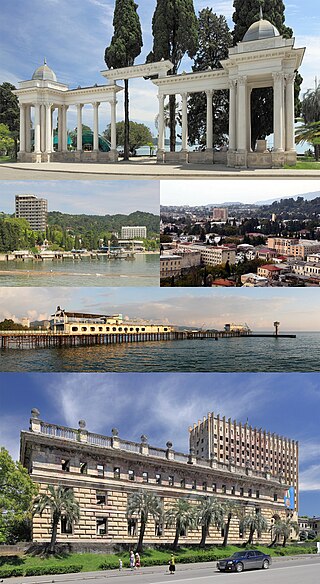
Sukhumi is a city in a wide bay on the Black Sea's eastern coast. It is both the capital and largest city of the Republic of Abkhazia, a partially recognised state that some countries consider a part of Georgia. The city has been controlled by Abkhazia since the Abkhazian war in 1992–93. The city, which has an airport, is a port, major rail junction and a holiday resort because of its beaches, sanatoriums, mineral-water spas and semitropical climate. It is also a member of the International Black Sea Club.

Dmitry Gulia was an Abkhazian Soviet writer and poet, considered to be one of the founders of Abkhaz literature. He is often called “The Father of Abkhazian Literature”.

The history of Abkhazia, a region in the South Caucasus, spans more than 5,000 years from its settlement by the lower-paleolithic hunter-gatherers to its present status as a partially recognized state.
The Bagramyan Battalion, also known officially as the Independent Motorized Rifle Battalion named after Marshal Ivan Khristoforovich Baghramyan was a unit formed in Abkhazia and predominantly composed of ethnic Armenians living in Abkhazia that fought together with Russia backed separatist Abkhaz forces during the War in Abkhazia (1992–93). Named in honour of the Soviet Armenian Marshal Ivan Bagramyan, the battalion fought against the forces of Georgia. It was subsequently disbanded. It is considered a terrorist organisation by many international research organizations and Georgia.
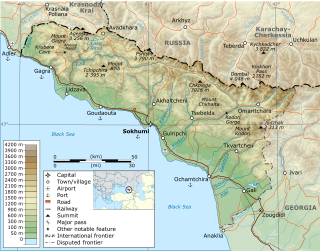
The War in Abkhazia was fought between Georgian government forces for the most part and Abkhaz separatist forces, Russian government armed forces and North Caucasian militants between 1992 and 1993. Ethnic Georgians who lived in Abkhazia fought largely on the side of Georgian government forces. Ethnic Armenians and Russians within Abkhazia's population largely supported the Abkhazians and many fought on their side. The separatists received support from thousands of North Caucasus and Cossack militants and from the Russian Federation forces stationed in and near Abkhazia.

The Abkhazian Armed Forces are the military forces of Abkhazia. The forces were officially created on 12 October 1992, after the outbreak of the 1992–1993 war with Georgia. The basis of the armed forces was formed by the ethnic Abkhaz National Guard. The Abkhaz military is primarily a ground force but includes small sea and air units. According to the authorities of the Republic of Abkhazia, the Abkhazian Land Forces are organised along the Swiss model – in time of peace they have personnel of 3,000 to 5,000 and in case of war further 40–50,000 reservists are called out. Georgia regards the Abkhaz armed forces as "unlawful military formations" and accuses Russia of supplying and training the Abkhaz troops.
Many inhabitants of Abkhazia are Orthodox Christians, With significant minorities adhering to Islam and the Abkhaz neopaganism, or the "Abkhazian traditional religion". The influence of this last has always remained strong and has been experiencing a revival through the 1990s and 2000s.
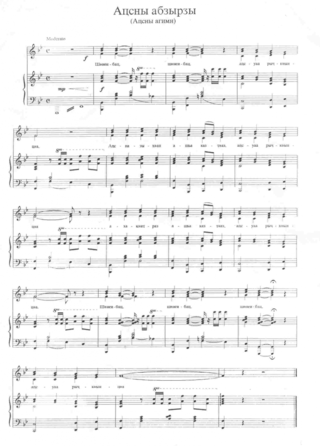
"Aiaaira" is the national anthem of the partially recognized state of Abkhazia. It was adopted in 1992. The lyrics were written by poet Gennady Alamia, and the music was composed by Valery Chkadua.

Abkhazia is a disputed territory between Georgia and Russian-backed Republic of Abkhazia, in the South Caucasus, on the eastern coast of the Black Sea, at the intersection of Eastern Europe and Western Asia. It covers 8,665 square kilometres (3,346 sq mi) and has a population of around 245,000. Its capital and largest city is Sukhumi.
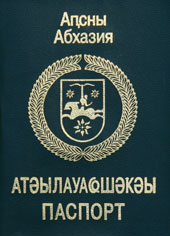
The Abkhazian passport is issued to citizens of the Republic of Abkhazia for the purpose of international travel and for the purpose of legal identification within Abkhazia. As Abkhazia is only recognised by Russia, Venezuela, Syria, Nicaragua and Nauru, for all other destinations Abkhazian citizens must use another passport for international travel.
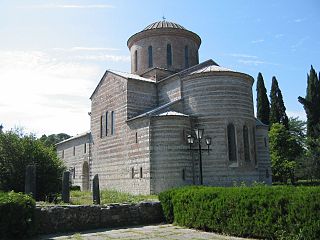
The Abkhazian Orthodox Church is an Eastern Orthodox church outside the official Eastern Orthodox ecclesiastical hierarchy. It came into existence when the Sukhumi-Abkhazian Eparchy declared on 15 September 2009 that it no longer considered itself part of the Georgian Orthodox Church and that it was "re-establishing the Catholicate of Abkhazia disbanded in 1795". Vissarion Aplaa is the Primate of the Abkhazian Orthodox Church since 2009 and is the self-proclaimed catholicos of the Church. It has two eparchies (dioceses) in Pitsunda and Sukhumi and is organized in 9 parishes.
This is an alphabetical list of Abkhazia-related articles.
Daur Vadimovich Kove was the Minister for Foreign Affairs of Abkhazia from 2016 until 2021.

















